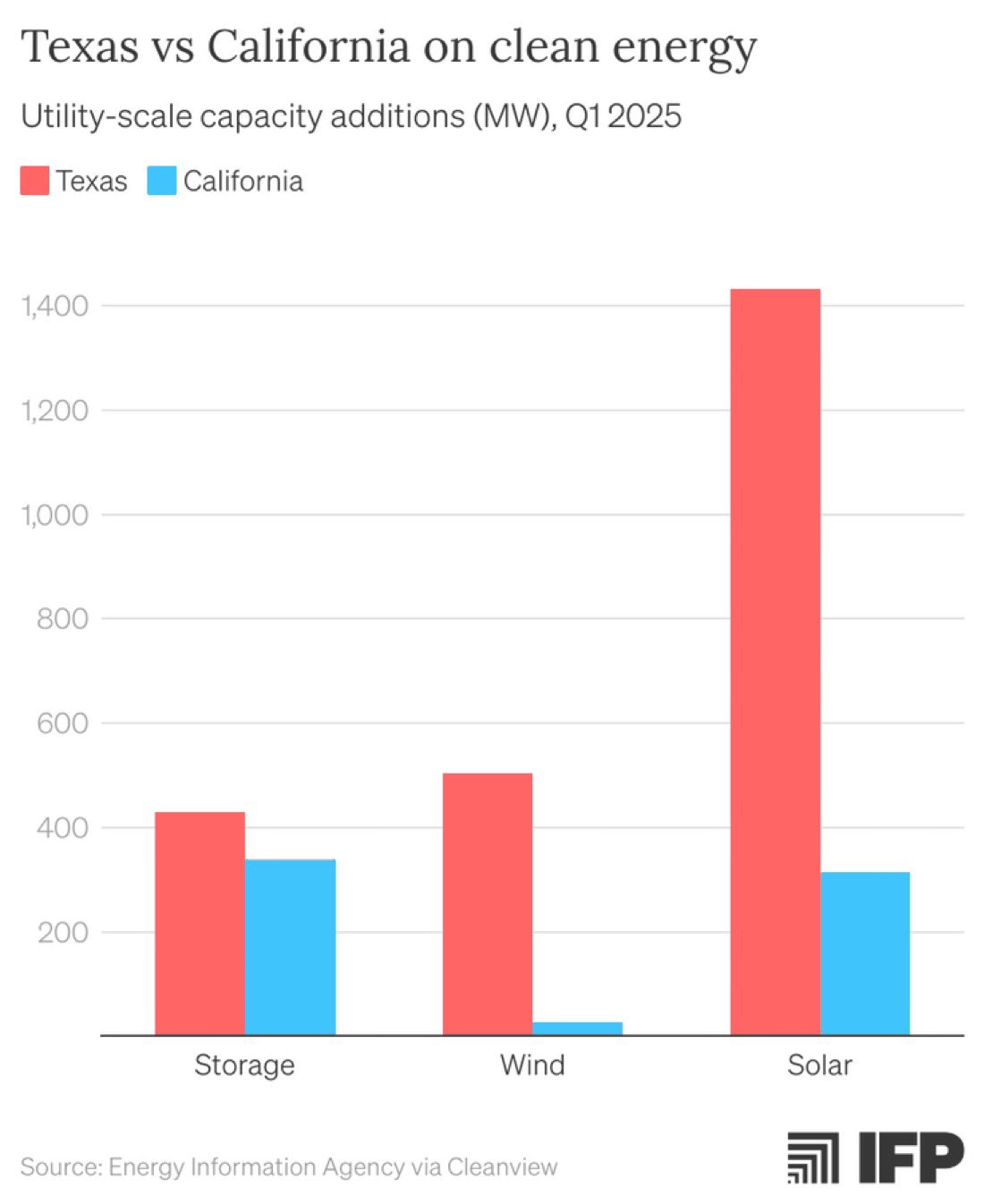Can the ‘Abundance Agenda’ Save the Democrats?
Dispirited liberals are embracing—and feuding over—a new book’s call for cutting red tape
Molly BallJune 1, 2025 at 5:00 am
A recent ‘Abundance Happy Hour’ in San Francisco featured a taping of a podcast whose guests have included prominent Democratic politicians.
The party’s postelection angst has found an unexpected life raft in the idea of “abundance,” catalyzed by the recent publication of a book by that name that argues that regulatory obstacles and an obsession with procedure have caused liberal governance to fail to deliver on its promises.
Democratic politicians are rushing to embrace the new mantra. New York Gov. Kathy Hochul, Minnesota Gov. Tim Walz, Maryland Gov. Wes Moore and Colorado Gov. Jared Polis have all name-checked it publicly. New Jersey Sen. Cory Booker discussed it at length in his recent 25-hour Senate speech. Former Vice President Kamala Harris and the U.S. Senate’s Democratic caucus are among the many politicians who have recently sought the authors’ counsel. Not one but two congressional caucuses have recently formed to push legislation advancing the ideas laid out in the book.
It isn’t just party elders who have bought into the idea. Local Abundance clubs have formed in multiple cities and on college campuses. At a recent “Abundance Happy Hour” in San Francisco’s Mission district, hundreds gathered on a weeknight this month to mingle with fellow devotees. Banners at the gathering read “BUILD AMERICA. DEFEAT FASCISM.”
Connor Skelly, 35, the COO of a residential remodeling company, said he was drawn to the ideas of “Abundance” because he wants his four children to be able to afford to live in San Francisco. “I think Democrats are looking for something to be for right now,” he said. “With Trump, there’s so much to be against. People are looking for something positive to be excited about.”
The book by Ezra Klein and Derek Thompson has been a surprise hit, with a sold-out national tour, hundreds of thousands of copies sold and two months on the bestseller list since its release in March.
The policy tome argues that Democrats must grapple with—and shoulder some blame for—the fact that blue states like California are mired in high-price stagnation, while red states such as Texas and Florida offer a dynamism and quality of life that keep attracting new residents. Regulations intended to protect consumers, communities and the environment, they say, have metastasized to create an administrative regime that prevents anything from getting built, from high-speed rail projects to housing.
California Gov. Gavin Newsom recently hosted Klein on his podcast for an in-depth 90-minute discussion, where he waxed somewhat defensive about the way the book depicts his state as Exhibit A for Democratic dysfunction; Newsom nonetheless proclaimed the book “essential reading for Democrats” and said he has been handing out copies to the leaders of the state legislature.
While Klein and Thompson’s diagnosis has echoes in conservative critiques of government and Elon Musk’s DOGE, the authors’ prescription is very different. Instead of taking a wrecking ball to the bureaucracy, the authors propose cutting red tape and unleashing the state as a stimulant to growth and innovation.
“The system is broken. The government is too inefficient and ineffective to meet the challenges of the 21st century,” Rep. Ritchie Torres (D., N.Y.) recently wrote on X. “But the answer is not DOGE. It is ABUNDANCE.”
As Democrats grope for a way forward in the wake of their 2024 election loss, advocates hope the party can present a new vision for the future by embracing the book’s call to streamline housing, transit, energy and scientific research.
“I want the 2028 primaries and the presidential race to be about who is for progressive abundance,” Steve M. Boyle, one of the San Francisco happy hour’s organizers and the executive director of the newly formed YIMBY Democrats for America, said in an interview. Proving that government can improve people’s lives, he argued, is the only way to prevent voters from turning to authoritarian strongmen.
The Abundance movement cuts across the party’s ideological fissures, attracting support from elements of the moderate establishment and the socialist left alike. “Look, I’m for Medicare for all and taxing billionaires more, but I also want effective government to make sure when we pass those things it actually works,” said Rep. Ro Khanna (D., Calif.), a progressive ally of Sen. Bernie Sanders (I., Vt.).
The book’s call to action has helped popularize and accelerate a movement that’s been brewing for a decade among policy experts and activists. “YIMBY,” or “yes in my backyard,” activists have pushed for housing reform across the country over the past decade and have become a political force in California. An Abundance conference in Washington last November drew 300 participants.
“The book has given voice to a feeling that people have had for a while—that it’s just too hard to build things,” said Rep. Josh Harder (D., Calif.), a swing-district moderate who recently launched the Build America Caucus on Capitol Hill. The 30-member bipartisan group hopes to push for policies such as permitting reform for energy transmission.
Among those in attendance at the Abundance happy hour was Nancy Tung, the chairwoman of the San Francisco Democratic Party, who said the book offers an answer to recent political backlash to perceived progressive overreach. Tung was part of a slate of self-styled moderates who won a majority on the party’s publicly elected central committee last spring. Rank-and-file voters want to see “results, not renaming schools,” she said.
“It’s the only really new, original thing happening on the left,” said Noah Smith, a center-left economics blogger cited as one of the movement’s intellectual leaders. Democrats, he said, should embrace abundance as a counterargument to President Trump’s zero-sum vision of restricted trade and immigration.
In her short-lived 2024 campaign, Harris’s promise to build 3 million new homes in America was the best-testing of her proposals, according to both her campaign and Trump’s. A “Yimbys for Harris” Zoom fundraiser drew 30,000 participants and raised more than $130,000.
To be sure, “Abundance” has enemies on the left, who have attacked the book in many essays, podcasts and book reviews. Critics argue the authors are blind to—or stooges of—the corporate power that is the true culprit for the problems the book lays out. Abundance, Aaron Regunberg and David Sirota argued recently in Rolling Stone, “encourages Democrats to focus on the wrong solutions, and elevates deregulatory narratives already being weaponized by the right.”
But Abundance proponents say making government more effective and limiting corporate power aren’t mutually exclusive. They argue that their platform is a route to the hearts of working-class voters, who may not follow politics closely but believe that rents are too high and progress too slow. They also hope it can help Democrats win back young voters by explicitly renouncing the prior generation’s failures.
The book’s authors, Thompson and Klein, said in interviews they hoped to galvanize a political movement but never dreamed it would catch on the way it has. Originally slated to come out last year, the book’s release was delayed by the authors’ procrastination—a delay that ended up being fortuitous when it landed the release in the middle of Democrats’ postelection soul-searching.
Klein said it was telling that so many Democratic pols intuitively grasped the book’s message. “I didn’t write a book that’s substantially about zoning reform and state capacity and think, ‘We’re headed to No. 1, baby,’” he joked. “When a book like this hits, it’s because it’s creating a way for people to have a conversation that they already wanted to have.”



